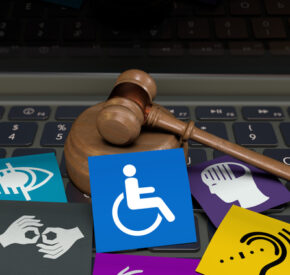Imagining a World Without 504
The real-life impact of Section 504 and the cost of losing it

I was born in 1992, two years after the passage of the ADA, and 19 years after the Rehabilitation Act of 1973. I’ve known no life without the rights and protections that these two laws provide me as a person with a disability. Now it’s 2025 and I’m in my 30s, well out of the K-12 education system, and have two advanced degrees under my belt. The recent push to end 504 has me stopping to imagine what my life could have been if 504 didn’t exist. Where would I be today? I invite you to take a little journey with me to illustrate why 504 is so important to me and the disability community.
Let’s start with when I was officially diagnosed, this didn’t happen until I was three because local doctors were waiting for me to “catch up”, but by three I still couldn’t walk or sit up on my own, but I could talk your ear off! Finally, after seeing a specialist, I had a diagnosis of Cerebral Palsy, and I could get services like Physical Therapy and medical equipment like my walker and wheelchair.
When I was three, 504 protected me from the doctors telling my parents I should be placed in an institution.
Then when I was five and it was time for me to start Kindergarten, 504 made it possible for me to take the same school bus as my peers with the support I needed. Like a car seat given my small size. 504 ensured I was in class with all the other five-year-olds and could access learning in a way that helped me explore the world. For example, crawling was my go-to mode of getting around because I could play with friends independently. 504 guaranteed I was provided Physical (PT) (body) and Occupational Therapy (OT) (hands and motor skills) twice a week.
Without 504 in place when I was in Kindergarten, I would have been segregated from my peers, stuck in my chair, and my family would have had to find therapy outside of school which would have cost money, time, and freedom to choose what I did after school.
First grade through sixth grade was a lot of the same. 504 meant that I had an Individual Education Plan (IEP), where my Teachers, PT, OT, and my parents got together to discuss my progress and goals for that year, both academically and physically. Whether it was walking with forearm crutches, or in fourth grade when OT decided I was ready to graduate because I told them I no longer wanted to write “the quick brown fox jumped over the lazy dog” for the ten millionth time in cursive. Without 504 who knows where I’d be?
Later in middle school and throughout the rest of high school was when the meetings shifted to be less everyone talking to my parents about me, and instead it was me telling them my goals and expectations, because after all it was my life.
I wanted to participate in extracurricular programs after school, I wanted to go to college, I had big plans, and my “team” of people was either going to get behind me or be left behind.
In middle school and high school, 504 gave me the power to ask for the support I needed, or to say no when something wasn’t going to work for me, and they had to respect that.
I was done with High School years before it was done with me.
I said no when my team recommended I stay in high school till 21, but if I felt I needed that extra time, and many people with disabilities choose to stay longer. That choice is offered, because of 504.
At 18 years old, I had the choice to stay in high school or to move on, because of Section 504.
I said no. I was able to advocate for my rights to have the life that I wanted, college, and a career.
No law is perfect, 504 is no exception, and my story is one of many. Some better, some worse, because 504 is just the standard. It really is in each school’s power to implement and support each student, and we as humans are not perfect.
If I had simply done what the people on my IEP team wanted, I may or may not be where I am today. But there is no doubt in my mind that 504 and the equal access to education I received in K-12 gave me the knowledge and tenacity to look at a room full of adults and advocate for the life that I wanted.
They may have limited their expectations of me, but I never limited myself.
If 504 is removed young children with disabilities will be left behind, placed back into segregated classrooms or schools, IEPs that build a team for that child will be a thing of the past, and these kids with disabilities who just want to go to school to learn, make friends, and dream of the future will get lost in the shuffle, because let’s face it, 504 and IEP plans take time and work, but the work today could lead to helping the tomorrow’s leader find their voice.
Whether you’re born with a disability like me, or it’s acquired later in life. Nobody asks for a disability, but it’s simply a part of life, and if we don’t support children with disabilities to be the best they can be. Then we decide that those children don’t matter, that those extra support needs are not worth the time.
Everyone deserves to have their basic needs met. Everyone deserves to have dreams, to experience wins and failures.
504 ensures that people with disabilities have those chances.
We must protect it.
For the children of today and tomorrow.
____
Raquella Freeman is a Tamman team member focused on creating more accessible digital documents and assets. She brings her lived experience as a person with cerebral palsy and perspectives to the work she does and she strives to ensure all people with disabilities feel empowered.





